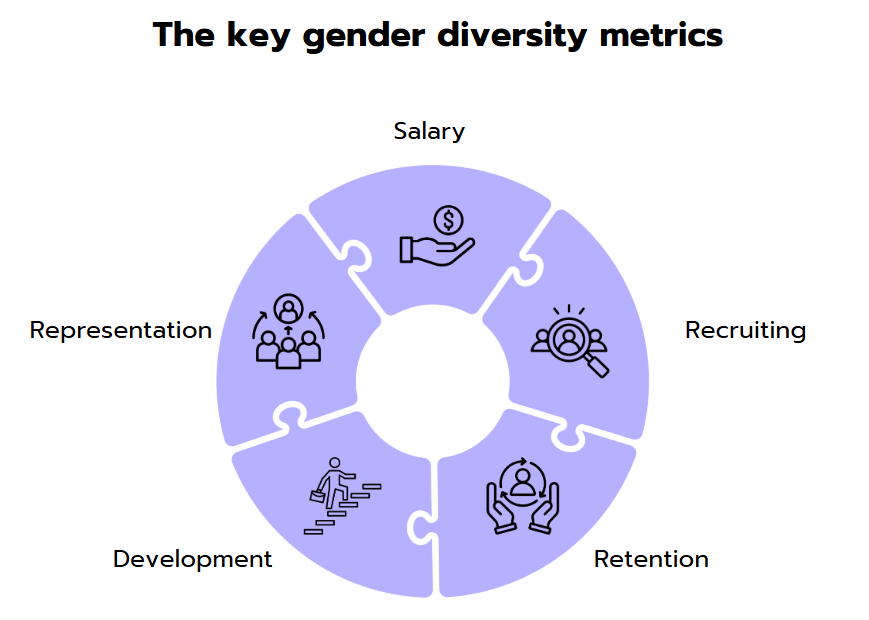Consulting offers great career prospects – high salaries, strong career growth and exciting challenges. Another plus: more and more firms are actively promoting diversity and creating opportunities for female talent. Yet, leadership positions in the industry are still largely male-dominated.
The 2023 Gender Diversity Index by BCG shows that companies with a more balanced gender distribution are more creative, innovative and ultimately more successful. Diverse teams make better decisions, work more efficiently, and create an environment where women tend to be more engaged and ambitious. But what does this mean in practice?
How do young female consultants experience their first years in the industry? What challenges and biases still exist? Where do companies need to step up their diversity efforts? If you’re considering a career in consulting but still have doubts, this article will give you the insights you need. Together with our female interview coaches, we’ll break down common myths, share real-world experiences, and give you practical tips for a successful start. 🚀
Why Women Are Essential in Consulting
The demand for diverse consulting teams is on the rise – many companies now actively seek female representation in their project teams. But why exactly do consulting teams benefit from having more women?
Research shows that diverse teams create better solutions – both for their clients and the end customers. A mix of perspectives leads to broader insights, more innovative approaches, and stronger decision-making. Additionally, women in consulting are often associated with specific strengths:
- Strong coaching skills: Women are seen as exceptional mentors and coaches, often bringing high emotional intelligence and strong communication skills to the table.
- Holistic thinking: They are often perceived as more reflective, helping to analyze problems from different angles and develop long-term strategies.
- Structured and efficient leadership: Clients frequently notice that projects led by women tend to stay on schedule and within budget.
- Stakeholder management expertise: Female project managers are often recognized for their ability to handle complex stakeholder dynamics with diplomacy and skill.
Of course, these qualities aren’t exclusive to women – but studies show that diverse teams consistently produce these positive effects. The trend is clear: diversity makes consulting stronger and more successful.
"Myths" About Women in Consulting – Still Relevant or Outdated?
The consulting industry has long been surrounded by stereotypes and misconceptions, especially when it comes to female consultants and their working conditions. We asked our female coaches to share their thoughts on five of the most common assumptions. Are they outdated myths or do they still hold true?
Myth No. 1: A successful consulting career isn’t compatible with a fulfilling family life.
Many women hesitate to pursue a consulting career, fearing they’ll eventually have to choose between their job and their family. But the industry has changed in recent years: Hybrid and remote work have become much more common since 2020, making travel and workload more flexible.
Some believe that, while balancing both is possible, a more honest discussion about the realities would be beneficial.
The key can also lie in a strong support system and clear communication – both professionally and personally.
Myth No. 2: A woman can’t make it to partner level.
Consulting firms usually start with a fairly even mix of male and female hires at the entry level. But as you climb the career ladder, the number of women in leadership roles starts to drop. Is it always like that? Our coaches share their thoughts.
That being said, women do face specific challenges along the way. But with determination and strong leadership skills, it can be done.
Myth No. 3: Men earn more than women in consulting.
The belief that consulting is a male-dominated industry often goes hand in hand with the assumption that men are paid more than women. In reality, a gender pay gap does exist in many firms – but not because women are paid less for the same work. Instead, the gap is largely due to fewer women reaching senior, higher-paid positions. On the same career level, male and female consultants typically earn the same salary.
However, some women have experienced barriers to promotion, which indirectly impact pay.
While inequalities in promotion still exist in some cases, others argue that consulting is one of the fairest, most performance-driven industries when it comes to pay.
Myth No. 4: Today, women in consulting have an advantage.
Diversity initiatives in consulting often spark debates about whether they truly support women or instead disadvantage men. Many large firms now have women-focused networks and sponsorship programs designed to help female talent advance. Some companies have even introduced gender quotas, which in certain cases might favor female applicants.
But does this really lead to unfair advantages? Here’s what our coaches think.
So yes, there's a growing trend of support for women in consulting – but that doesn’t mean they have an unfair advantage.
Myth No. 5: Female consultants fear male-dominated client groups.
Consulting firms work with large multinational companies, many of which have traditionally been male-dominated – especially at the executive level. This dynamic could have two possible effects:
- It might discourage women from pursuing a consulting career in the first place.
- It could create uncertainty or discomfort for female consultants when working with predominantly male clients.
However, experiences vary depending on the company culture and industry.
How Consulting Firms Can Break Down Barriers for Women
To make it easier for women to enter and advance in consulting, firms first need to analyze key gender diversity metrics. Only by identifying gaps can they implement targeted measures to promote equal opportunities.

- Salary: Are there gender-based pay differences? Companies should regularly review salaries to ensure that women are paid equally for the same work.
- Recruiting: How diverse is the hiring process? Targeted outreach and objective selection criteria can help attract more women to consulting.
- Retention: How long do women stay with the company? High turnover rates among female employees may indicate disparities in work conditions or career progression opportunities.
- Development: Do women have the same access to career growth? Firms should ensure that training, promotions and leadership programs are gender-neutral and actively support female employees.
- Representation: What percentage of leadership roles are held by women? Examining the distribution of women across different levels of seniority reveals whether they have equal opportunities to advance into top positions.
Many consulting firms have already introduced targeted programs based on these diversity metrics to actively support women in their careers. The most impactful initiatives include:
- Coaching & Mentoring Programs: Personalized support to help women advance their careers, anticipate challenges and overcome obstacles before they become roadblocks.
- Networking & Recruiting Events: Dedicated opportunities for women to connect, exchange insights and gain exposure to consulting careers – helping firms attract and retain top female talent.
- Cultural Shifts: Training for leaders and project managers to foster inclusive workplaces where teams feel supported and valued.
- Flexible Work Models: Options like part-time roles, remote work, and customized schedules to help balance career growth with personal priorities.
- Parental Leave & Career Reintegration: Structured maternity and paternity policies, along with dedicated return-to-work programs to prevent career interruptions.
- Financial Support: Subsidies for childcare and overtime compensation for parents to ease the burden of balancing work and family life.
- Facilities for Nursing Mothers: Dedicated spaces in office buildings to support a smooth transition back to work after parental leave.
Still Have Questions? Our Top 5 Female Case Interview Coaches are here to help!







